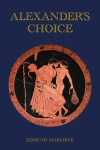(Boylove Book Reviews) - 'Lunch with Elizabeth David' by Roger Williams, 1999
- Used by permission of the author. All rights reserved. Review date: December 22, 2015
Intro
This is a review of Lunch with Elizabeth David by Roger Williams (1999), of possible interest to some here as a novel mostly about the boyloving writer Norman Douglas.
|
A Portrait of Benevolent Egotism
Having then followed the later story of Eric through snippets to his life as a police inspector in East Africa in 1925, two middle chapters are devoted to Douglas stranded in Antibes in the early days of the 2nd World War and enjoying new friendship with the future food writer Elizabeth David, whose spirit is more pervasive than her fleeting appearances. This sets the scene for the concluding chapter from which the novel takes its name, when Eric, David and his other most important friends meet 83-year-old Douglas for a farewell lunch in Capri in 1951. Unfortunately though, all this accounts for little more than half the book, and the rest is given up to an uninspiring account of two intermarried families in England between 1985 and 1994 with highly tenuous links to Douglas and David. Though one’s interest is retained through ultimately disappointed hopes of unraveling mystery, I am really not sure what the point of it is. One might argue that it illustrates the tremendous influence David had already had on British cooking by that time or that it compares the general if occasionally waspish acceptance of Douglas’s pederasty by his social circle with the uninformed revulsion of our age, but, if so, what a laborious way of doing so. Some of the details of their lives are so mundane and irrelevant to the plot that I began to wonder if the links might be no more than an excuse the author had contrived to tack his own autobiography on to his novel. While there is serious doubt in my mind as to what if anything holds the novel together, I have no doubt that much the most interesting and controversial theme of the story is the relationship of Eric and Douglas, which will seem deeply alien and indeed alienate many like the modern families depicted who know nothing about pederasty except that it disgusts them. For those who are interested in understanding more, Williams affords insight, naturally of course limited, since this is about one boy and one man, but rare enough to be fascinating. Lest it be assumed that the upper-class Douglas effectively bought the working-class Eric as his catamite, I should emphasise this was not so. There was never remuneration. Douglas charmed Eric and his parents into believing rightly that their Italian adventure would be educational and beneficial for him, and so much was it so that the adult Eric always looked back on it as his golden age. Far from using greater wealth to get his wicked way, Douglas was then a still unsuccessful writer struggling to find enough for them to eat and at one time living off money Eric was sent by an aunt. The relationship, depicted with great honesty and delicacy, was neither anything resembling the abuse it would automatically be assumed to be today nor quite up to the ancient Greek ideals of pederasty. Douglas’s attitude to sex was hedonistic (“It’s ridiculous when some trifle becomes a crime just because it used to be a sin, and it only became a sin because some impotent old antediluvian once got jealous of someone else’s pleasure”), though he never failed to honour and value the strong friendship it had cemented. Though he gave a lot of himself to Eric, he sometimes shocked him by his callousness to others, his family especially. Still, his morality at least lived up to the deceptively modest ideals he set forth in his novel South Wind that “the attitude of a man towards his fellows should be that of non-intervention, of benevolent egotism” and “nobody had a right to call himself well-disposed towards society until he had grasped the elementary fact that the only way to improve the universe was to improve oneself, and to leave one's neighbour alone.” Eric was finally “ravished … the length and breadth of Calabria”, but the sex began playfully months into their already-deep friendship. The immediate effect of “the secret pleasure he had shared with Uncle Norman” was to give him “a confidence and an introspection that set him a little apart from everyone he now saw.” Much later, “thinking back to Italy when the sun shone and, because no one had said what they were doing was wrong, everything they did seemed perfectly right,” he was simultaneously already aware of and disturbed “by the image of himself as an educated pederast’s working-class receptacle.” This ambivalence arising from the contradiction between his experience and how he knew some others perceived it endured without resolution. At the final eponymous lunch to which he brought his dull German wife Helen, when the forbidden nature of the friendship was alluded to in a gaffe, Eric was “crushed between the grand old man and the humiliated Helen, between enormous pride and unbearable shame.” Williams has made excellent use of Mark Holloway’s magisterial biography of Douglas as well as Douglas’s own books, and his accomplishment in bringing him so much to realistic life is considerable. His writing is suffused with Douglas’s own wit and charm and so much in tune with him that though I would have preferred a more cohesive and emotionally compelling plot, I feel sure Uncle Norman would approve. Edmund Marlowe, author of Alexander’s Choice, another novel exploring the dynamics of pederastic love, http://www.amazon.com/dp/1481222112 |
